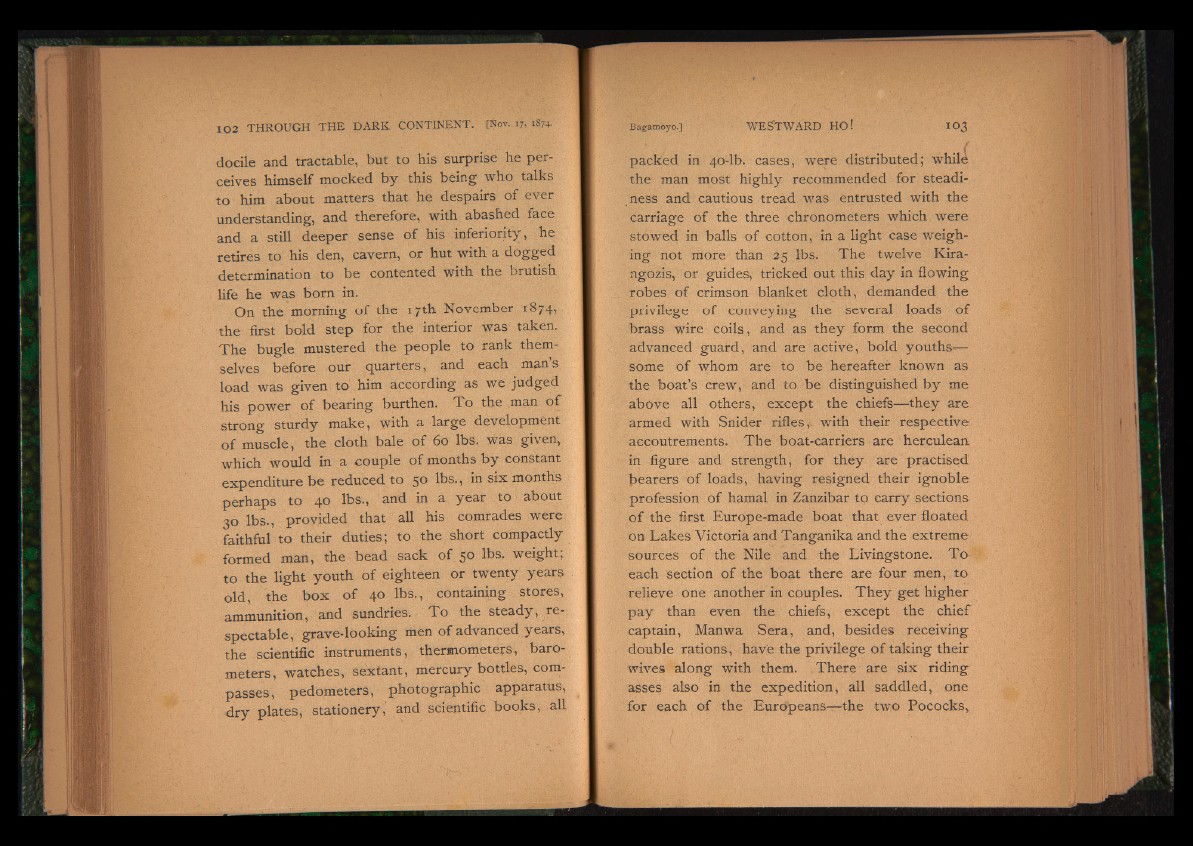
docile and tractable, but to his surprise he perceives
himself mocked b y this being who talks
to him about matters that he despairs o f ever
understanding, and therefore, with abashed face
and a still deeper sense o f his inferiority, he
retires to his den, cavern, or hut with a dogged
determination to be contented with the brutish
life he was born in.
On the morning o f the 17th November 1874,
the first bold step for the interior was taken.
The bugle mustered the people to rank themselves
before our quarters, and each man s
load was given to him according as we judged
his power o f bearing burthen. T o the man o f
strong sturdy make, with a large development
o f muscle, the cloth bale o f 60 lbs. was given,
which would in a couple o f months b y constant
expenditure be reduced to 5 ° lbs., in six months
perhaps to 40 lbs., and in a year to about
30 lbs., provided that all his comrades were
faithful to their duties; to the short compactly
formed man, the bead sack o f 50 lbs. weight;
to the light youth o f eighteen or twenty years
old, the b o x o f 4 ° lbs., containing stores,
ammunition, and sundries. T o the steady, respectable,
grave-looking men o f advanced years,
the scientific instruments, thermometers, barometers,
watches, sextant, mercury bottles, compasses,
pedometers, photographic apparatus,
d ry plates, stationery,' and scientific books, all
packed in 40-lb. cases, were distributed; while
the man most highly recommended for steadiness
and cautious tread was entrusted with the
carriage o f the three chronometers which were
stowed in balls o f cotton, in a light case weighing
not more than 25 lbs. The twelve Kira-
ngozis, or guides, tricked out this day in flowing
robes o f crimson blanket cloth,- demanded the
privilege o f conveying the several loads of
brass wire coils, and as they form the second
advanced guard, and are active, bold youths-—
some o f whom are to be hereafter known as
the boat’s crew, and to be distinguished b y me
above all others, except the chiefs— they are
armed with Snider rifles with their respective-
accoutrements. The boat-carriers are herculean
in figure and strength, for th ey are practised
bearers o f loads, having resigned their ignoble
profession o f hamal in Zanzibar to carry sections
o f the first Europe-made boat that ever floated
on Lakes Victoria and Tanganika and the extreme
sources o f the Nile and thp Livingstone. T o
each section o f the boat there are four men, to
relieve one another in couples. T h e y g et higher
p a y than even the chiefs, except the ch ie f
captain, Manwa Sera, and, besides receiving
double rations, have the privilege o f taking their
wives along with them. There are s ix riding
asses also in the expedition, all saddled, one
for each o f the Europeans— the two Pococks,